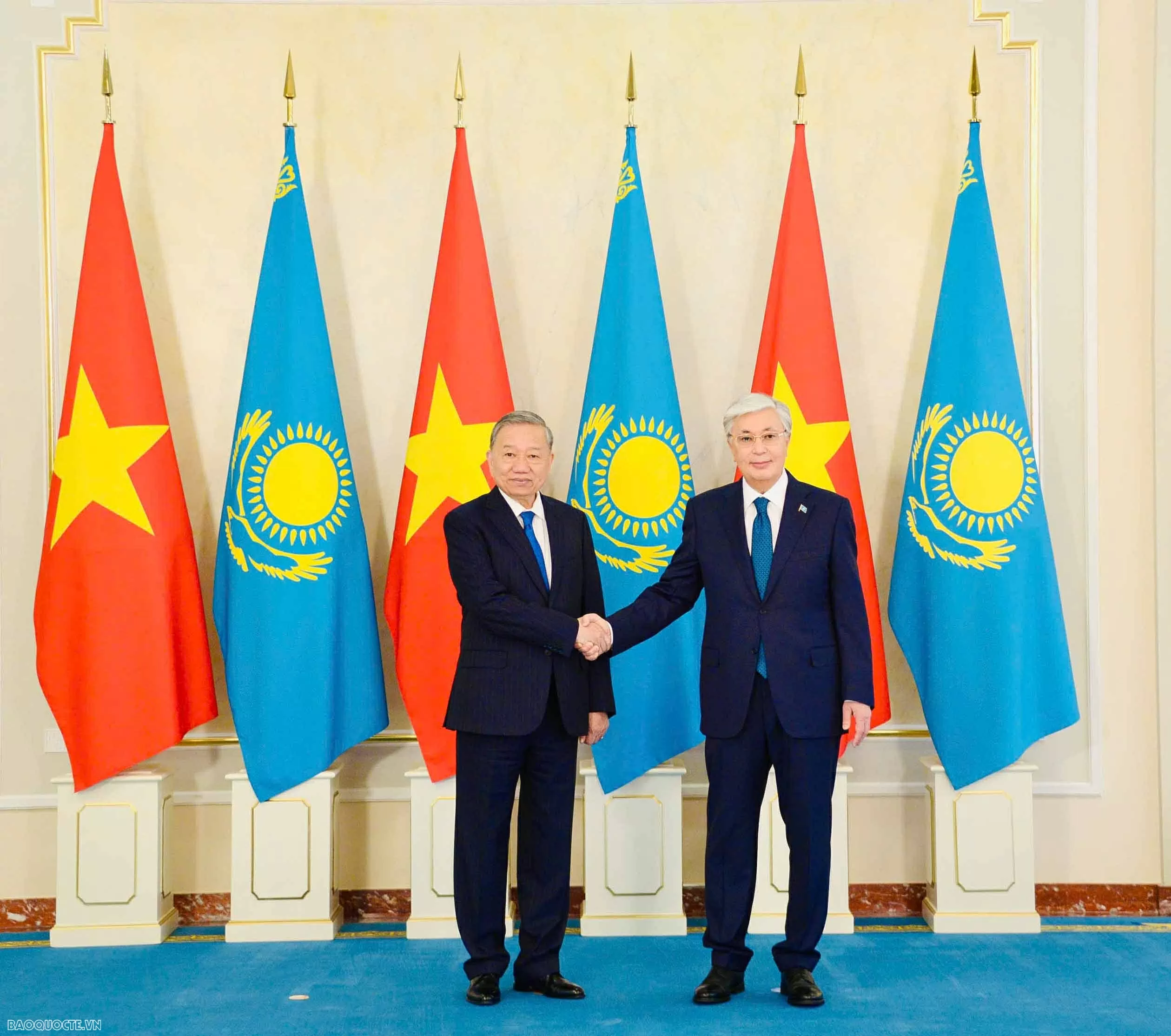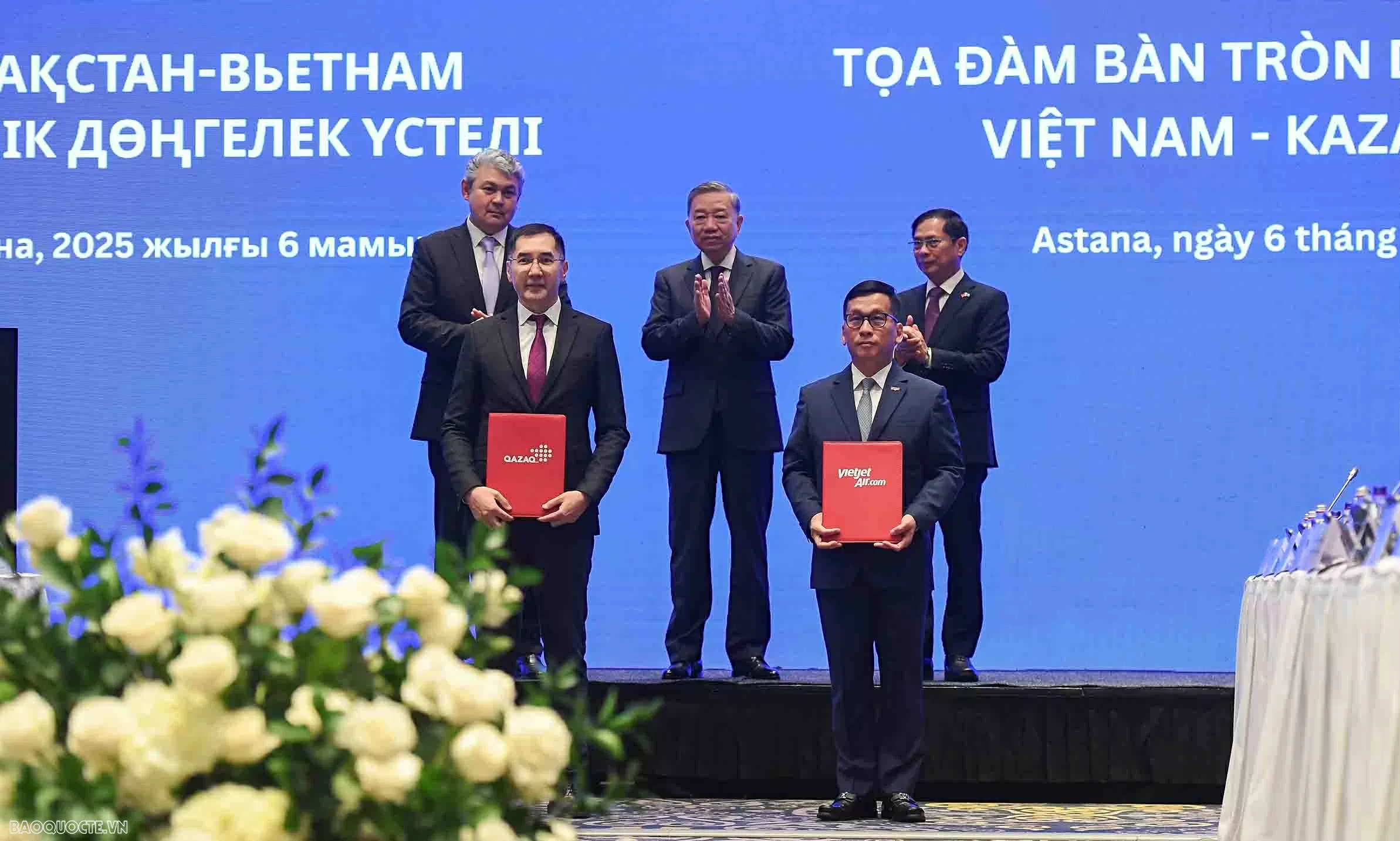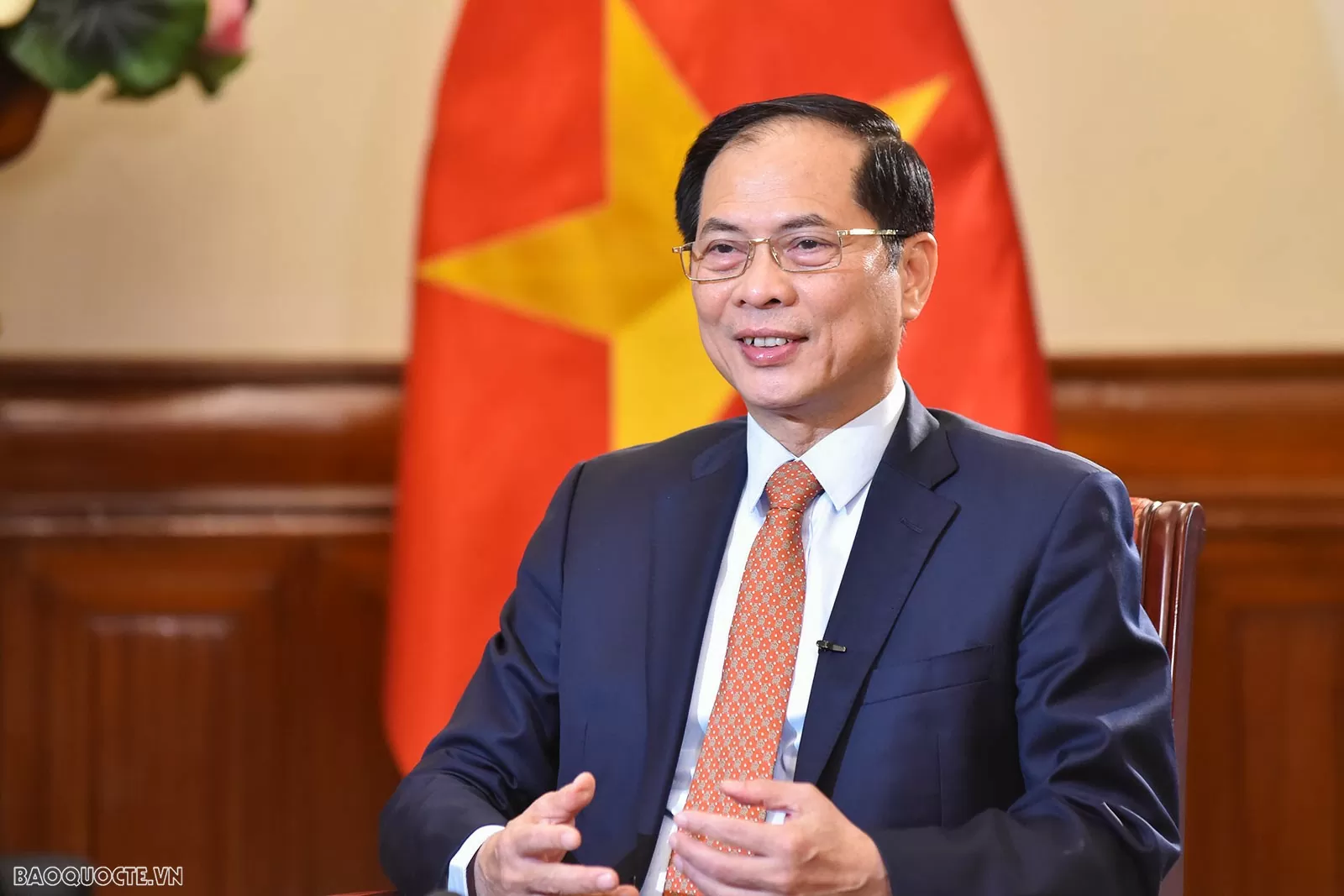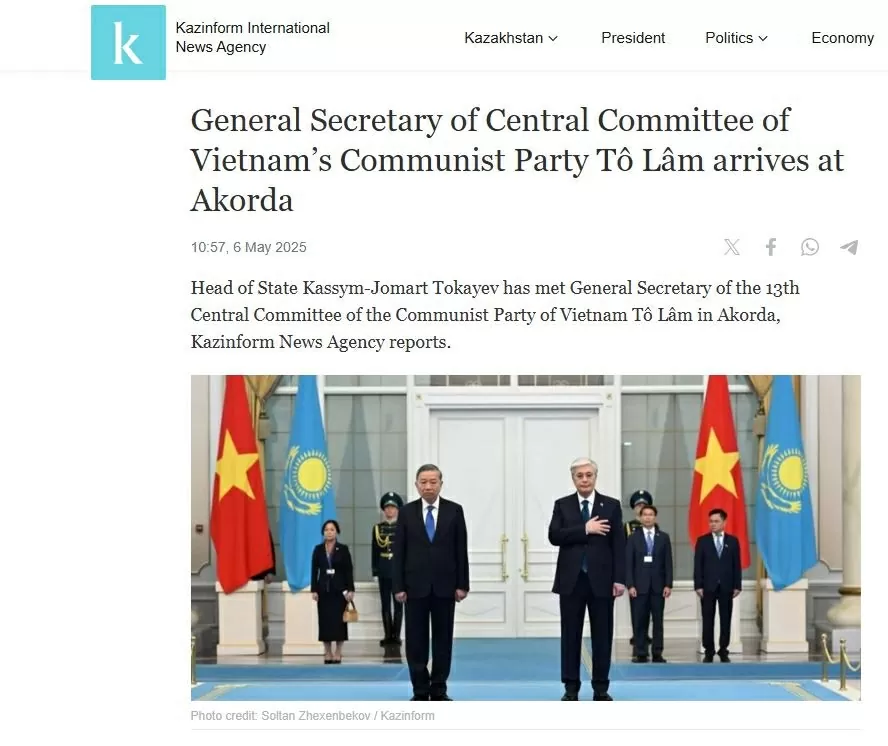
General Secretary To Lam’s visit opens strategic avenues for Vietnam–Kazakhstan cooperation: Deputy PM
Latest
 |
| Kazakh President Kassym-Jomart Tokayev and General Secretary To Lam on May 6, 2026. (Photo: Van Hieu) |
Viet Nam is a resilient nation that has endured throughout its history of struggles for independence and defense of sovereignty against foreign aggressors in the 20th century. Could you share which valuable historical lessons have shaped Viet Nam’s current foreign policy in international relations?
The outstanding achievements in Viet Nam’s struggle for independence, national reunification, and the current process of renewal all bear the hallmark and significant contributions of foreign affairs. The valuable historical lessons accumulated over the past 80 years remain entirely relevant and continue to illuminate the path for Viet Nam’s diplomacy in the new era, an era of national advancement.
First is the lesson of ensuring the highest national interests. Viet Nam’s diplomacy has always imbued President Ho Chi Minh’s teaching: “Always serve the nation's interests.” Today, the national interest remains the compass guiding all actions, the most fundamental basis for determining Viet Nam’s foreign policy and orientation, on the principles of equality, cooperation, mutual benefit, and in accordance with the United Nations Charter and international law.
Second is the lesson of combining national strength with the strength of the times. In the current period, diplomacy continues to play a pioneering role in mobilizing favorable external conditions and resources, such as the trends of peace, cooperation, and development, the advancements of the Fourth Industrial Revolution, and emerging development trends such as digital transformation and green transition, to serve national development.
Third is the close coordination between foreign affairs and defense, security, and other sectors in both policy formulation and implementation. At present, we define foreign affairs, together with defense, security and other domains, as playing a vital role in contributing to safeguarding the nation from early and from afar, firmly ensuring independence, sovereignty and territorial integrity, creating a peaceful, stable and favorable international environment, and harnessing resources and conditions for national development.
Fourth is the lesson of integration with the world, placing the country into the mainstream of the times, which today is about comprehensive, extensive, and effective international integration, making it a driving force for development and a shared undertaking of the entire political system and the people.
These invaluable historical lessons continue to shape Viet Nam’s foreign policy in the new era, adapting to the evolving international context and helping Viet Nam further affirm and elevate its position in the international arena.
 |
| Party General Secretary To Lam and Kazakh Deputy Prime Minister Yermek Kosherbayev witness the signing cooperation documents of business of the two countries. (Photo: Nguyen Hong) |
The prolonged tensions between the United States and China pose challenges to security and stability in the Asia-Pacific region. Meanwhile, Viet Nam is increasingly recognized by the international community as a country playing a particularly important role in the regional security architecture. Could you share the principles and policy adjustments that enable Viet Nam to maintain a balance among major power centers amid the current complex context?
Viet Nam’s consistent and overarching foreign policy is firmly anchored in the principles of independence, self-reliance, diversification and multilateralization of external relations. Viet Nam strives to be a friend, a reliable partner, and a responsible member of the international community, actively and proactively pursuing comprehensive and extensive international integration. The fundamental principle and motto guiding Viet Nam’s foreign affairs is to safeguard the highest national interests in accordance with the UN Charter and international law, to resolutely and persistently defend independence, sovereignty, unity, and territorial integrity, and to apply the principle of “being firm in policy yet flexible in execution” to maintain peace, stability, and serve the cause of building and defending the country.
At the same time, Viet Nam adheres to the “Four No’s” defense policy: no military alliances, no alignment with one country against another, no foreign military bases or use of Vietnamese territory to oppose other countries, and no use or threat of force in international relations.
On that basis, despite fluctuations in the current international and regional environment, Viet Nam is cultivating a broadly open foreign policy landscape. Viet Nam has established diplomatic relations with 194 countries, is an active member of over 70 international organizations and multilateral forums, and developed a network of strategic and comprehensive partnerships with 34 countries. Viet Nam fosters friendly, practical, and effective cooperation with major powers, notably having strategic partnerships or higher with all non-permanent members of the UN Security Council. Furthermore, Viet Nam is increasingly contributing actively and responsibly to addressing global issues and shared concerns within the international and regional communities, while promoting ASEAN’s centrality in the regional architecture.
 |
| Vietnamese Deputy Prime Minister and Minister of Foreign Affairs Bui Thanh Son. (Photo: Tuan Anh) |
Could you share your assessment of the recent highlights in economic, trade, and investment cooperation between Viet Nam and Kazakhstan and the prospects for future collaboration?
Viet Nam and Kazakhstan enjoy excellent traditional friendship and cooperation. Despite the geographical distance, the peoples of Viet Nam and Kazakhstan have consistently nurtured warm, close-knit relations. In recent years, our traditional friendship and multifaceted cooperation have evolved into a closer and more effective partnership, yielding positive outcomes, especially in the areas of economics, trade, and investment.
Kazakhstan stands as Viet Nam’s second-largest trading partner in the Eurasian Economic Union (EAEU). In 2024, bilateral exceeded USD 800 million, reflecting a remarkable doubling of the figure from 2023. In the first quarter of 2025 alone, the bilateral trade turnover reached USD 146.3 million, marking an 18.4% increase year-on-year. Our two nations have established the Intergovernmental Committee on Economic, Trade, Scientific, and Technical Cooperation mechanism, which has convened 11 sessions on a rotational basis. At present, both sides are actively implementing the Joint Action Plan for 2023 - 2025, with a strategic outlook toward 2030, aimed at advancing bilateral economic and trade cooperation. We are also promoting the establishment of a Vietnamese Trade Representative Office in Kazakhstan and a Viet Nam - Kazakhstan Joint Business Council. While the number of investment projects in each other's territory remains modest, their upward trajectory in recent years signals a growing interest from Vietnamese enterprises in the Kazakh market. Cooperation in tourism and people-to-people exchanges have also expanded, with 21 direct flights operating weekly. The influx of Kazakh tourists to Viet Nam is growing steadily, reaching approximately 150,000 arrivals in 2024.
Despite these achievements, there remains ample room and untapped potential for Viet Nam and Kazakhstan to further strengthen cooperation for mutual development. To advance economic, trade, and investment ties, both countries should prioritize transport connectivity, especially in the railway sector. Viet Nam’s export products and those of Kazakhstan are largely non-competing directly, allowing Viet Nam to increase exports of its key goods, such as agricultural products, seafood, textiles, footwear, and electronics, into Kazakhstan and through Kazakhstan to other markets along the East - West and North - South transit corridors.
Furthermore, both sides possess advantages that can be leveraged to further enhance cooperation in finance, energy, oil and gas, mining, education and training, science and technology, as well as promising new fields such as digital technology, clean energy, advanced materials, and artificial intelligence (AI).
I am confident that the State visit of General Secretary To Lam to the Republic of Kazakhstan will open up strategic avenues for cooperation, fostering comprehensive cooperation across all areas in the current context. This will serve to further consolidate and deepen the traditional friendship between our two countries.
 |
| Kazakh media report on General Secretary To Lam’s activities in Astana. |
What are the opportunities and challenges that Viet Nam and Kazakhstan can leverage and jointly address in promoting sustainable development and responding to climate change?
Cooperation on sustainable development and climate change response is a relatively new area in Viet Nam - Kazakhstan relations, but one in which both countries have shown strong interest. Notably, this topic was included for the first time in the Joint Declaration on the Establishment of a Strategic Partnership between Viet Nam and Kazakhstan during this visit.
In the face of increasing non-traditional security challenges, including climate change, Viet Nam and Kazakhstan have the opportunity to shape a new, broader, and more substantive framework for cooperation aimed at long-term sustainable development.
Our two countries enjoy a strong political foundation and share commitments to global goals, including the Paris Agreement on Climate Change. More importantly, we each possess distinct but complementary development experiences: Viet Nam has strengths in disaster response and sustainable agriculture practices while Kazakhstan has valuable expertise in water resource management and renewable energy development.
However, differences in natural conditions, and varying levels of readiness in terms of finance, technology, institutions, and environmental management present challenges that both sides must jointly address. As this is a newly emerging area of cooperation, it is essential to translate our shared commitment into concrete, action-oriented programs and projects.
With a strategic vision, Viet Nam seeks to work closely with Kazakhstan to develop an integrated framework for cooperation, spanning from scientific research, green technology transfer, circular economy development to the training of high-quality human resources in environmental issues and climate change. At the same time, we hope that the two countries will jointly advance common initiatives at international forums, thereby amplifying the voice of developing nations in shaping a more inclusive and sustainable global development architecture in the future.













